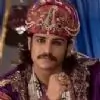I was really at a loss as to how to treat this triptych, which plunged from the excellent to the less than tolerable . The last episode was so devoid of any content worth mentioning that I would have left it out altogether, except that there were a few questions that needed to be asked.
The only significant episode, that needed detailed analysis, was the first one. So let me deal with that first, and then summarise the other two. And grade the whole at 50/100: 30 for the first episode. 15 for the next, and 5 for the last!
Episode 46: Shadows of the past
The one image that stayed with me at the end of this episode was not that of Ruqaiya storming away gracelessly from her shock defeat by the Hindu Begum she detests, and whom she wishes to despise. One knew that lacking both foresight and self-control, she would also lack the astuteness to gracefully congratulate Jodha, and thus minimize the negative impact of her own upset.
Nor that of a victorious Jodha (how she won, by making a move again after her last move, which Ruqaiya had declared to be a very bad one, is a mystery, but then so are many things in Ekta's serials) saying, in a smooth left handed compliment to her husband, that she played the chess game Shahenshah ka maan rakne ke liye, while refusing the Shahi firman with elaborate politeness. The young lady is learning the ropes of public behaviour in the Mughal court, I thought to myself.
A lesson in siyaasat: Nor that of Jalal later lecturing a raging Ruqaiya on the rules of siyasat and the need to play down your defeats and play up your victories. One catches a glimpse then of a mind naturally astute, capable of doing all it takes, including biding its time, to seize even a very slight chance of victory. A mind honed by his Khan Baba, a master of statecraft a la Chanakya, till its razor sharp edge rivalled that of Jalal's shamsheer.
Rajat plays this scene straight, his face as sharp and focussed as his mind or his sword. When Jalal tells his foolish bachpan ki dost what his astute Khan Baba had taught him, one can literally see the wheels turning inside his dimaag. He has learnt his lessons well, has Jalal.
Dushman ko kamzor samajhna sabse pehli galti hoti hai, aur kayi bar aakhri galti saabit hoti hai.. Humein bhi malal hai ( at Jodha's unexpected victory), bahut hai, par hum jatayenge nahin..
And he stays true to this maxim. After the first reaction of shock and irritation, his face is as smooth and unruffled as if it was made of marble. Even after Jodha upset s him further by turning down his farman, there is only a sudden flare of anger in his eyes, but it dies down at once, and when he stands up to leave, his face and eyes, though sombre, are inscrutable.
Khan Baba ne humein sikhaya hai ki kabhi apni shikast ki shikanj apne maathe par mat aane dena.. Apne dushman ki jeet ki khabar logon ko mat hone dena, aur apni jeet ka jashn zor shor se manana.. Isi ko siyaasat kehte hain.
Readjustment of tactics: Then he adds something that sums up what he feels at this point about Jodha. Ruqaiya, usi ghode par sawaari karne mein mazaa aata hai jo tumhein pehle gira chukha hota hai..
As I noted above, what Jodha said, about having played Shahenshah ka maan rakhne ke liye, was a left-handed compliment. Jalal, being no fool, knows that, and all that registers with him is the rejection of his farman, which obviously rankles badly. It, and the collapse of his plan to pull Jodha down a couple of pegs, has probably wiped out the empathy he felt for her after the banjara incident, which was shown by his daydreaming of her holding a flag amidst the banjara dancers.
He is upset and disappointed about Jodha winning, coupled, it is true, with reluctant admiration of her tenacity and resourcefulness in a tight situation. But more than that, he is readjusting his tactics towards her, to take into account his realisation that she is tougher, cooler and more capable than he had thought initially.
Whence the comment to Ruqaiya about not underestimating your opponent. That is not said just to calm her down, it is what he feels. Jodha to him is not a beloved mount that he caresses, as he seems to do with any horse near him, and feeds with lumps of sugar. She is a wild filly whom he wants to break in any which way, and he does not have many options.
Shadows of the past: No, the scene that lingered in my consciousness was that of Jalal - not the Shahenshah - kneeling on the floor of the Diwan-e-Aam, embracing the little Hindu boy, with eyes brimming with unexpected tears. Of the recalled anguish, and the lost look on his face, as the shadows of the past rise again to haunt him.
His father's brother lunging at him, sword in hand and murder in his heart, livid with hatred for Humayun, as Jalal cowers behind his aunt, who manages to shield him from her husband and save his life. Bairam Khan and Mahaam Anga standing by him, and with him, against all odds, with rocklike loyalty, yes, but also with genuine affection and caring.
His words, after he rises to his feet and orders that that the boy's parents be released and their property be restored to them - because bhale hi Shahenshah ne unhein sazaa di ho, par Khuda ke bande ne unhein maaf kar diya hai - are rooted in his conviction, based on his own childhood trauma, that no child should have to live deprived of the parental presence and affection.
Ek bachche ke liye uski zindagi mein uske walidein ki kya ehmiyat hoti hai, yeh humse behatar koyi nahin jaanta...Bhale hi wo apne walidein ke bina poori duniya par fateh kar le, lekin phir bhi andar se akela hota hai.. Hum nahin chahte ki koyi bhi bachcha apne walidein ke bina zindagi basar kare..
Bhale hi Shahenshah ke liye uska faisla badalna galat ho, par deen aur imaan honewale aadmi hone ke naate hum is bachche ko uske walidein lautayenge.. Aur humein is mein kuch galat nahin lagta..
So there it was again, up front and centre, the hurt that is still unhealed and festers within him, and the loneliness that eats away at the innermost core of his being. I have written of this often in my earlier posts, and I will not repeat any of that now. Today, the wounds of the past in Jalal's zehen were ripped open again by sheer chance, and the simple plea of an uncomprehending and yet courageous little Hindu boy.
The denouement of that scene was incredibly moving. And the striking, and strange thing was that the pain that was so visible in Jalal's eyes was mirrored in Ruqaiya's face,which twisted in empathy. A lifelong friendship cannot be dismissed or written off so easily; it has its own intimacies and symbiotic bonds.
Khuda ka banda: Jalal's reversal of his original judgement is not on the merits of the case, which were in any case very poorly set out by the complainant .
In any autocracy, the incredible folly of the husband in not stating his real complaint - about the seizure of his house and his cow and of the attempt to convert him to Islam by force - and instead railing against the regime as a whole in loud tones, castigating it for its injustice to Hindus, and demanding that the law should be the same for all, would have produced the same punitive response (it is to be noted that the response is from a Minister, not from the Shahenshan directly). The wife then makes matters worse by attacking the Shahenshah directly and dragging in his marriage to a Hindu queen. It is no wonder that Jalal's temper flares up and she is sent to prison as well.
If anyone had said to Henry VIII of England even a fraction of what those two said to Jalal , they would not have been jailed. They would have been publicly executed for high treason, and possibly hung, drawn and quartered. Those were brutal times, and that was only a few years earlier than this time, as mentioned in my footnote. Jalal is very moderate, whatever his foolish wife might think An emperor would soon lose control if all and sundry could come and berate him like that. The folly of that couple is unbelievable.
But for the equally incredible good sense of the child - his Aapka mere liye kya aadesh hai? brings the Emperor up short - things would have stayed as they were. And if his parents had had even a fraction of his natural, diplomatic articulateness, they would have got justice from the Shahenshah right at the beginning.
Nonetheless, it is only because Jalal, after that intial spurt of anger at the parents, has the kindness of heart, and the empathy, to understand the plight of the child deprived of both his parents, that he sets aside the earlier ruling, and restores to the child his home and his happiness. It takes a meaure of greatness, especially in an absolute ruler, to recognize his mistake publicly and to correct it.
That he explains the reason for his doing so to the whole assemblage is another mark of a great ruler, the recognition of the need to carry his people with him.
It is also significant that this time, he does not dress his reversal up in reasons of state, as he did while explaining to his advisers his decision to marry Jodha. It is primarily an emotional response to an emotional wrong, and he has no hesitation in acknowledging it as such. Or in weeping in public, or exposing his inner wounds to the public gaze. He is too strong a character to have such reservations; he goes by what he feels is right, and he will then not change his path for anyone or anything.
This needs to be noted. I have always held that while Jodha might, in the future, amplfy and strengthen Jalal's positive traits, such as a sense of justice, of fairness to all his subjects, religious tolerance ( a very, very rare trait anywhere in the world at that time) and so on, she does not create them. They are already present in him, and they have already surfaced at various moments independently of Jodha. His assertion, when chastising Adham Khan for his atrocities in Malwa, that even in a war, there would be no oppression of women, children or the aged, is a case in point.
Schadenfreude in the harem: The rest is incidental. That some of the other begums taunt Ruqaiya about her defeat, and that they see a new tolerance towards the Hindus in the Diwan-e-Khas incident, and attribute it to Jodha, are both predictable. Ruqaiya's crushing response to them is accurate, but it will not dampen the malice of those over whom she has always ridden roughshod, and who now rejoice to see her hold, as they perceive it, weakening.
Ear plugs in demand!: Nor was I at all taken, by episode end, with Jodha in full Jalal the Jallad mode after the Diwan-e-Aam episode, raging, but this time at her Kanha for having bound her to a man jisme manushyata ke saath koyi sambhandh hi nahin hai. By now, such declamations from Jodha are par for the course, and do not need more than a passing mention. One does wish, however, that she would not glare so much, with the whites of her eyes showing all round the iris! It makes her look somewhat demented.
As for her Kanha, he must long since have equipped himself with a sound pair of earplugs!😉
Amer par sirf nazrane hi barsenge: By episode end, Bharmal & Co, are finally departing, after Jalal's slightly tongue in cheek assurances: Aapko Amer ke liye fikarmand hone ki zaroorat nahin. Sara Hindustan jaanta hai ki Jalal ne aapki beti se shaadi ki hai.. Ab Amer par nazrane hi barsenge, kisi ki buri nazar nahin!
What I could not understand was Bharmal's remark about Amer's uttaradhikari too not being there, thus exposing the kingdom to predators. Why then is Bhagwan Das still in Agra? To babysit Mansingh? 😉
Finally, Jodha is once more in full battle mode, any need for surface amenities to her patidev having departed with her parents.
Episode 47: L'affaire du farman
This was the only segment worth mentioning in the whole episode. For Mynavati's prolonged advice to Jodha about what falls to a queen's lot, and about the fact that man ho ya na ho, use Raja ka nirnay maan na hi padta hai, was clearly so much water off a duck's back as far as Jodha was concerned. She obviously let all this in thru one ear and let it out thru the other.😉
Sending the unwanted Shahi farman back to Jalal thru a servant was unnecessary , impolite, and ill-advised on Jodha's part, especially after her mother's parting homily about the need for a Rani to show obedience to her husband, but that is Jodha all over. After all, she listened to another such homily about the danger for Amer if she did not accept Jalal's gifts, and then came out and deliberately burnt the shaadi ka joda, endangering all of Amer with this heedless, self-centred gesture. Uske saamne yeh farman kya cheez hai?
I for one cannot understand why Jalal needs to force his Shahi firman on her; it seems to have become a matter of his ego now. She, having predictably left the Diwan-e-Am before Jalal showed his soft side, is ready to bite his head off. And so she does, metaphorically speaking.
Is sansaar mein aisa kuch hai hi nahin jo aap humein de sakte hain ( it is another matter that niyati lands Jodha a left handed blow, and forces her to eat these grand words,😉 and use the despised farman to save Moti, and that very soon!) ..Jo vyakti sirf cheen na jaanta ho, wo kisiko kya de sakta hai?.. And then on to the rest of the tirade about what Jalal had done to that little boy.
Jalal probably considers it beneath his dignity to explain that he did not punish that Hindu couple after all, so he merely tells her, with ill-suppressed anger, grasping her arm hard: Adhuri jaankaari gunaah hoti hai, Jodha.. Hum kya kar sakte hain aur kya nahin, yeh wo 6 saal ka bachcha bhi achchi tarah jaanta hai..
He then descends from the general to the personal, asserting, as far as the farman is concerned, that he could have forced her to accept it in front of her parents, par humein aapko apni taaqat dikhane ka koyi iraada nahin..Finally, his face mere inches from hers, Shahenshah ka adab kiya jaata hai, us se khauff khaya jaata hai.. Bar bar hamare sabr ki aazmayish na karo, ki uska sabr tooth jai..
Jodha's reaction: She is hardly the kind who will wonder which adhoori jaankaari he is referring to, and try to ascertain the details, which must by now have been broadcast across the harem. She has never been able to put herself in another's shoes and see things from that person's point of view, and her attitude to facts is selective; they are welcome only if they buttress her pre-conceived notions. So she will hug her resentment to herself and luxuriate in it.
But it seems that Jalal's last words give her some pause, for she does not fling the farman after Jalal's departing figure. Maybe even our veerangana is a tad afraid of him, after all!
And so we start all over again, with the next round of the battle of this quintessentially Odd Couple: Rhett and Scarlett, or Petruchio and Kate: take your pick.
Rooh ki baatein: Along with the scene of a sleepless Jalal deeply disturbed by Jodha's accusation that he knows only how to snatch things from people, there was a charming helping of this staple. When Jodha asserts that Jalal was wrong in claiming that he had no heart, and thus was incapable of loving, what struck me was Jalal's bitter, self-deprecating comment: Haan, Jodha.. Shayad yahi faraq hota hai soch aur sach ke beech.. Faraq ek aaleem ki soch aur ek anpadh jaahil ki soch ka..
Bitter because it reveals the depth of regret that Jalal now feels at his inability to read and write, a regret that leads him to downgrade his phenomenal intellectual strengths - not to speak of his unbelievable ability to retain anything that was said or read out to him kantasta - by labelling himself an anpadh jaahil.
NB: A historical footnote for those interested in such matters. The Emperor Akbar and Queen Elizabeth I of England were contemporaries for practically the whole of their very long reigns: Akbar from 1556-1605 and Elizabeth I from 1558-1603. They also appear to have both had a very rough and endangered childhood
After her mother, Anne Boleyn, was executed for treason by her father, King Henry VIII, the Princess Elizabeth was always walking a tightrope with her terrifying father. Later, she was constantly exposed to the risk being executed for treason by her elder stepsister Queen Mary, whenever some of the Protestant opponents of the rigidly Catholic Mary plotted to assassinate her and replace her by the non-Catholic Elizabeth.
Jalal seems to have been equally at risk from his uncle, and then was always on the run from his father's enemies in the court of Sher Shah Suri.
That they both surmounted all this childhood trauma and went to become very great rulers who wrote their names in history is truly remarkable.
On a jocular note, in my old post, my chronically tongue in cheek friend, Moontide, had suggested
What if the nuptial-political alliance was not between Amer and Agra...but between the last of the Tudors and the best Mughal of them all? Would we be rooting for Elizabeth-Akbar right now?
Then who would have changed whom? Would the Tudor dynasty have continued? Or was that a healthy way of having kept the British colonization of Hindustan at bay? Or would that pre-pone the reverse colonisation process of today by several centuries...meaning would it have been a colonization of the British by the Mughals/Hindustanis?
To which I replied as follows, and this gives a good idea of the relative strengths of Tudor England and Mughal India to those misled by British accounts the defeat of the Spanish Armada.
I am so glad to find someone who actually reads and likes my footnotes! As for the Agra-London alliance, it would never have got off the ground, as London would have seemed, to the successors of Bairam Khan, a tinpot capital of a tinpot kingdom, huddling for safety behind the protective width of the English Channel. And riven by religious discord, with its Queen constantly under threat from the Catholic Church, acting thru Philip II of Spain, a hugely powerful and rich empire, all the hype and hoopla about the defeat of the Armada notwithstanding.
Agra would have thought it an unequal match, and then again Elizabeth was no hoor pari to bewitch a Shahenshah, even in the highly airbrushed portraits exchanged before royal marriages in those days, a practice that often had disastrous consequences.
Remember Anne of Cleves, Henry VIII's Wife no. 4? When she arrived in London, she proved to be so unlike her portrait that Henry divorced her instantly. Of course once she had caught a glimpse of her lord and master, a corpulent, diseased wreck of the handsome youth he once was, the divorce must have seemed manna from Heaven!
Episode 48: Harem follies
I have very little to say about the OTT spectacle to which we were treated right thru this episode.
The Shahenshah-e-Hind storming thru the harem at the dead of night, shamsheer in hand, to catch an intruder. When Jalal's short fuse explodes, he is exactly like the Energiser Bunny: all action and no sense 😉 .
Maham's Girl Friday, Resham 2, managing to procure a goatherd's corpse, tuck a farewell letter addressed to Motibai into its waistband, and smuggle the lot into the harem kitchen. And accomplish this feat within the few minutes that must havee elapsed from the time she informs Maham of Adham's presence in the harem, and Jalal's furious irruption on the scene!!
NB: It is a curious point that whereas Ruqaiya 2 is nowhere near as good as Ruqaiya 1, and Motibai 2 is similarly a poor replacement for Motibai 1, Resham 2, with eyes constantly on the roll, is a distinct improvement on the flat faced Resham 1!
The rest: Ruqaiya was, well, Ruqaiya. That is to say, quick to action, but short on thinking her actions thru in advance, whether it was egging Jalal on to search the harem for the intruder, or trying to make a ghulam of the redoubtable Maham. And then, predictably, falling flat on her face.
Motibai was excellent in her blind panic. My heart went out to her. Jodha too was very convincing as the compassionate, supportive mistress-cum-friend.
Lastly, the proceedings of this week should, hopefully, have brought it home to Jodha that when the chips are down, the only one who can be of any help to her is the patidev whom she loves to hate.
Questions of the Day:
- What, by the way, was a goatherd doing with his flock at the dead of night?
-Why on earth does Jodha, constantly praised for her intellect, not think of pointing out to Jalal - even if it did not occur to the overwrought Shahenshah on his own- that it is impossible for a man like the dead chap, clearly of the poor class, to be able to write, and that too so impeccably, and on such a classy piece of silken fabric?
It was so patently ridiculous that when neither Jalal - who could not have written it himself! - nor Jodha raised this point, it made me think very poorly of their IQ.
- Why does Jodha leave the terrified Motibai alone with the poisonous Mahaam Anga? If she had insisted on staying, there was nothing Mahaam could have done to terrify the poor creature into keeping mum wrt Adham Khan's chasing her and his subsequent sneaking into the harem hiding under her dupatta. It was unbelievably stupid of Jodha.
And so on to the trial of Motibai and its unexpected denouement. Bye folks, till Thursday next.
Shyamala/Aunty/Akka/Di








































68